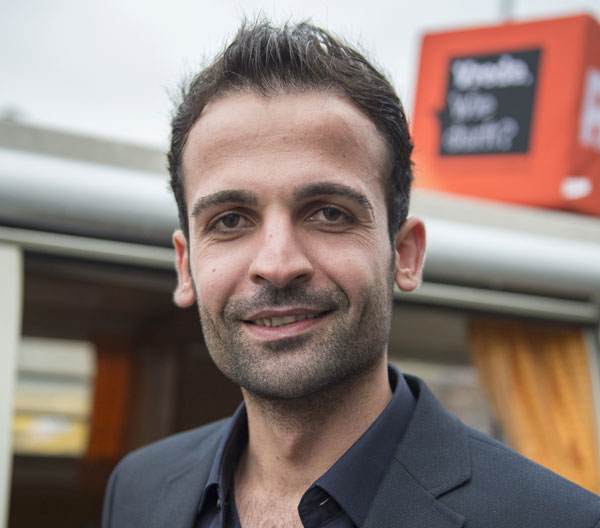Zuhair Khlo Lazgeen visited the Netherlands recently to talk about his work with displaced people in his province of Duhok in northern part of Iraqi Kurdistan and to help PAX present the report Sinjar After ISIS. This was his second time here, and much has happened since his last visit in October 2014. PAX spoke with Zuhair at our offices in Utrecht in June.
Zuhair works with internally displaced people in the Duhok governorate, and lives in his native village, Sharya (approximately 12,000 residents). As part of the local NGO Harikar, Zuhair focuses on assisting displaced people who do not live in refugee camps. Those living in the camps, he says, come under the auspices of various other organizations. But those living outside the camps, either in tents on their own, or in half-destroyed buildings, are particularly vulnerable. They are hard to find, and aid does not reach them.
Zuhair is himself Yezidi. When ISIS took over areas of northern Iraq, they killed thousands of Yezidis and forced hundreds of thousands to flee, a campaign that is now being recognized as genocide. It began on August 3, 2014, when ISIS stormed into Sinjar (150 km west of Sharya). Tens of thousands of people escaped to Sharya, where they crammed into schools, other public buidlings, and buildings under construction. But then ISIS moved closer, and Sharya also no longer felt safe. Most of them fled again. Zuhair took his family to the city of Duhok, then came back to Sharya to help care for the few families who were unable to flee. He has been working out of Sharya ever since.
Humanitarian aid
“If it weren’t for the work of international agencies, and the food and water they air-droped to people on the besieged mountain of Sinjar, many, many more would have died,” says Zuhair. Among the Yezidis and other minorities, the international help is much appreciated. Nevertheless, the mood is pessimistic. Humanitarian aid plays a major role in helping people to survive, but in no way does it guarantee that the Yezidis and other minorities have a future in northern Iraq. Given the lack of centralized authority, and the infighting amongst competing militias, minority groups are still in danger. Most of the displaced people do not even want to return to their former villages. If they do go back, it’s only because they have no other choice.
Make a difference
Then why did Zuhair go back to his village? Why didn’t he stay in Duhok, where he would be safer? Or go even further away? “If not for the work that I do, I would have tried to go to Europe myself. But here I can really make a difference, for a lot of people. So even though part of me says to leave, another part says to stay and work harder. The minorities in northern Iraq really need it.”
So he continues to defend minority rights and help displaced people, even though the future for Yezidis and other minorities in northern Iraq is so uncertain. In the meantime, Zuhair is ensuring one aspect of his own future – he recently became engaged to be married. His fiancé, Erivan, came to Sharya to work with the NGO Harikar, and she and Zuhair fell in love. Zuhair, beaming with happiness, says, “This is the only joy I have experienced during this whole mess.”
Read also: Sinjar after ISIS: returning to disputed territory
See also Sinjar after ISIS (report)




